Jaguar F-Pace vs Renault Symbioz – Which one offers the better deal?
Compare performance, boot capacity, efficiency and price at a glance.
Find out which car is the better choice for you – Jaguar F-Pace or Renault Symbioz?
Costs and Efficiency:
Price and efficiency are often the first things buyers look at. Here it becomes clear which model has the long-term edge – whether at the pump, the plug, or in purchase price.
Renault Symbioz has a clearly advantage in terms of price – it starts at 24400 £, while the Jaguar F-Pace costs 56400 £. That’s a price difference of around 31972 £.
Fuel consumption also shows a difference: Jaguar F-Pace manages with 1.80 L and is therefore clearly more efficient than the Renault Symbioz with 4.50 L. The difference is about 2.70 L per 100 km.
Engine and Performance:
Power, torque and acceleration are the classic benchmarks for car enthusiasts – and here, some clear differences start to show.
When it comes to engine power, the Jaguar F-Pace has a clearly edge – offering 575 HP compared to 158 HP. That’s roughly 417 HP more horsepower.
In acceleration from 0 to 100 km/h, the Jaguar F-Pace is clearly quicker – completing the sprint in 4 s, while the Renault Symbioz takes 9.10 s. That’s about 5.10 s faster.
In terms of top speed, the Jaguar F-Pace performs evident better – reaching 286 km/h, while the Renault Symbioz tops out at 180 km/h. The difference is around 106 km/h.
There’s also a difference in torque: Jaguar F-Pace pulls convincingly stronger with 700 Nm compared to 265 Nm. That’s about 435 Nm difference.
Space and Everyday Use:
Cabin size, boot volume and payload all play a role in everyday practicality. Here, comfort and flexibility make the difference.
Both vehicles offer seating for 5 people.
In curb weight, Renault Symbioz is evident lighter – 1436 kg compared to 1951 kg. The difference is around 515 kg.
In terms of boot space, the Renault Symbioz offers to a small extent more room – 576 L compared to 470 L. That’s a difference of about 106 L.
In maximum load capacity, the Renault Symbioz performs somewhat better – up to 1682 L, which is about 254 L more than the Jaguar F-Pace.
When it comes to payload, Jaguar F-Pace distinct takes the win – 589 kg compared to 379 kg. That’s a difference of about 210 kg.
Who wins the race?
The Jaguar F-Pace proves to be dominates this comparison and therefore becomes our DriveDuel Champion!
Jaguar F-Pace is the better all-rounder in this comparison.
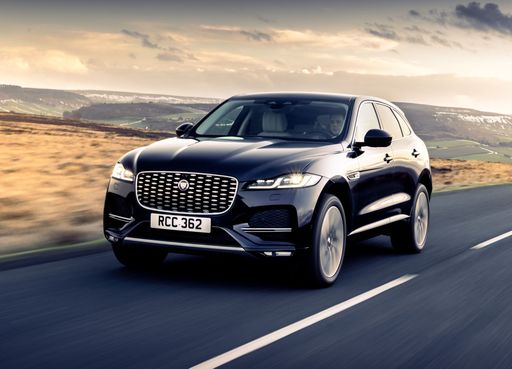
Jaguar F-Pace
Jaguar F-Pace
The Jaguar F-Pace effortlessly combines luxury and performance, offering an exceptional driving experience. Its sleek design is complemented by a refined interior that ensures comfort even on the longest journeys. With advanced technology features, the F-Pace remains at the forefront of innovation, making it a standout choice in the SUV segment.
details @ media.jaguar.com
@ media.jaguar.com
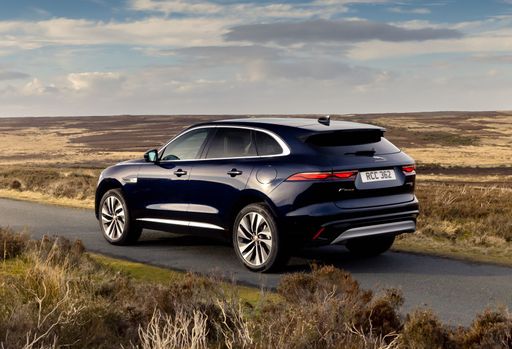 @ media.jaguar.com
@ media.jaguar.com
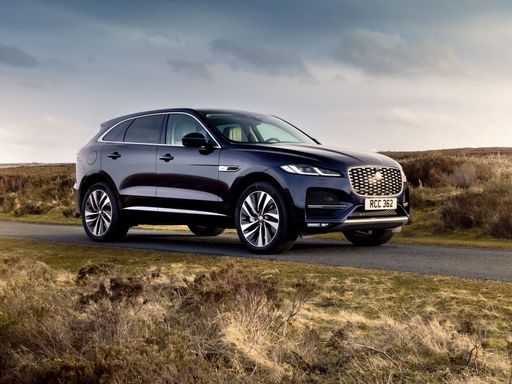 @ media.jaguar.com
@ media.jaguar.com
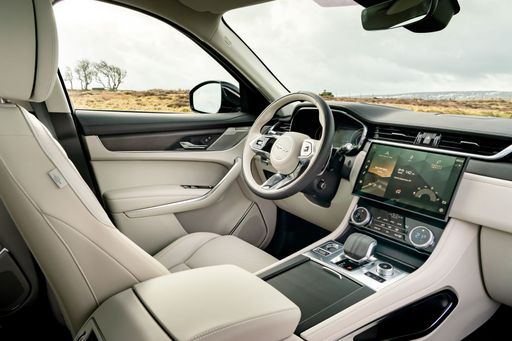 @ media.jaguar.com
@ media.jaguar.com
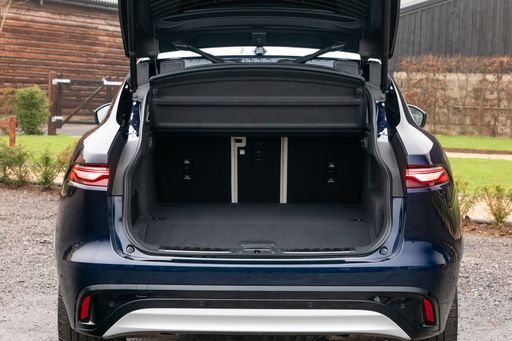 @ media.jaguar.com
@ media.jaguar.com
Renault Symbioz
The Renault Symbioz is an innovative concept car that explores the future of autonomous and connected driving. Its design seamlessly integrates indoor living space features with cutting-edge automotive technology, creating a comfortable and modern environment. The Symbioz highlights Renault's vision of an eco-friendly and connected mobility experience, paving the way for the next generation of smart vehicles.
details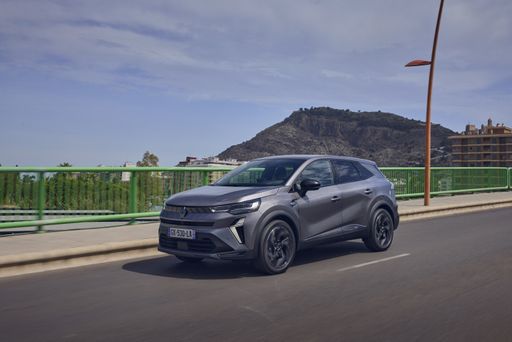 @ media.renault.at
@ media.renault.at
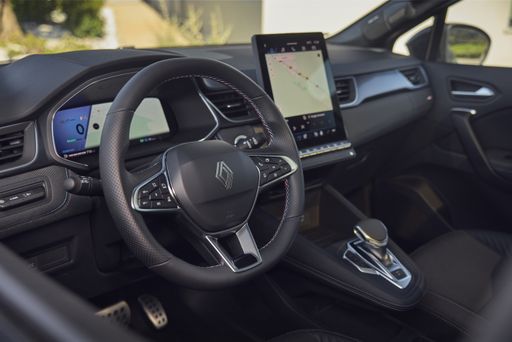 @ media.renault.at
@ media.renault.at
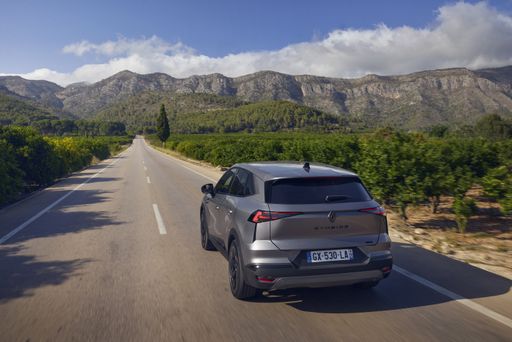 @ media.renault.at
@ media.renault.at

|

|
|
|
|
Costs and Consumption |
|
|---|---|
|
Price
56400 - 100800 £
|
Price
24400 - 30700 £
|
|
Consumption L/100km
1.8 - 12 L
|
Consumption L/100km
4.5 - 5.9 L
|
|
Consumption kWh/100km
-
|
Consumption kWh/100km
-
|
|
Electric Range
64 km
|
Electric Range
-
|
|
Battery Capacity
15.40 kWh
|
Battery Capacity
-
|
|
co2
41 - 274 g/km
|
co2
102 - 134 g/km
|
|
Fuel tank capacity
62 - 83 L
|
Fuel tank capacity
48 L
|
Dimensions and Body |
|
|---|---|
|
Body Type
SUV
|
Body Type
SUV
|
|
Seats
5
|
Seats
5
|
|
Doors
5
|
Doors
5
|
|
Curb weight
1951 - 2230 kg
|
Curb weight
1436 - 1544 kg
|
|
Trunk capacity
354 - 470 L
|
Trunk capacity
492 - 576 L
|
|
Length
4747 - 4762 mm
|
Length
4413 mm
|
|
Width
1936 mm
|
Width
1797 mm
|
|
Height
1664 - 1670 mm
|
Height
1575 mm
|
|
Max trunk capacity
1299 - 1428 L
|
Max trunk capacity
1582 - 1682 L
|
|
Payload
457 - 589 kg
|
Payload
376 - 379 kg
|
Engine and Performance |
|
|---|---|
|
Engine Type
Diesel MHEV, Petrol MHEV, Plugin Hybrid, Petrol
|
Engine Type
Petrol MHEV, Full Hybrid
|
|
Transmission
Automatic
|
Transmission
Manuel, Automatic
|
|
Transmission Detail
Automatic Gearbox
|
Transmission Detail
Manual Gearbox, Automatic Gearbox
|
|
Drive Type
All-Wheel Drive
|
Drive Type
Front-Wheel Drive
|
|
Power HP
163 - 575 HP
|
Power HP
140 - 158 HP
|
|
Acceleration 0-100km/h
4 - 10.1 s
|
Acceleration 0-100km/h
9.1 - 11.2 s
|
|
Max Speed
195 - 286 km/h
|
Max Speed
180 km/h
|
|
Torque
380 - 700 Nm
|
Torque
250 - 265 Nm
|
|
Number of Cylinders
4 - 8
|
Number of Cylinders
4
|
|
Power kW
120 - 423 kW
|
Power kW
103 - 116 kW
|
|
Engine capacity
1997 - 5000 cm3
|
Engine capacity
1333 - 1789 cm3
|
General |
|
|---|---|
|
Model Year
2024
|
Model Year
2025
|
|
CO2 Efficiency Class
G, B
|
CO2 Efficiency Class
D, C
|
|
Brand
Jaguar
|
Brand
Renault
|
What drive types are available for the Jaguar F-Pace?
Available configurations include All-Wheel Drive.
The prices and data displayed are estimates based on German list prices and may vary by country. This information is not legally binding.
